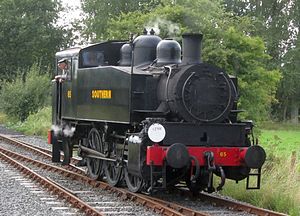SR USA class
| Southern Railway USA class | |||||||||||||||||||||||||||||||||||
|---|---|---|---|---|---|---|---|---|---|---|---|---|---|---|---|---|---|---|---|---|---|---|---|---|---|---|---|---|---|---|---|---|---|---|---|

USA class locomotive No.65 in Southern Railway livery
|
|||||||||||||||||||||||||||||||||||
|
|||||||||||||||||||||||||||||||||||
|
|||||||||||||||||||||||||||||||||||
|
|||||||||||||||||||||||||||||||||||
|
|||||||||||||||||||||||||||||||||||
| Sources: | |||||||||||||||||||||||||||||||||||
| Type and origin | |
|---|---|
| Power type | Steam |
| Builder |
|
| Model | S100 |
| Build date | 1942-43 |
| Specifications | |
|---|---|
| Configuration: |
|
| • Whyte | 0-6-0T |
| • UIC | C n2t |
| Gauge | 4 ft 8 1⁄2 in (1,435 mm) standard gauge |
| Driver dia. | 54 in (1.372 m) |
| Wheelbase | 10 ft 0 in (3.05 m) |
| Length | 29 ft 8 in (9.04 m) |
| Loco weight | 41 short tons 9 cwt (37.6 t; 37.0 long tons) |
| Fuel type | Coal |
| Fuel capacity | 17.8 short hundredweight (0.81 t; 0.79 long tons) |
| Water cap | 1,000 imp gal (4,500 l; 1,200 US gal) |
| Boiler pressure | 210 psi (1.45 MPa) |
| Cylinders | Two, outside |
| Cylinder size | 16 1⁄2 in × 24 in (419 mm × 610 mm) |
| Valve gear | Walschaerts |
| Valve type | 8 in (203 mm) piston valves |
| Performance figures | |
|---|---|
| Tractive effort | 21,600 lbf (96.08 kN) |
| Career | |
|---|---|
| Operators | |
| Class | SR: USA |
| Power class | BR: 3F |
| Number in class | 14 (plus one bought for spares) |
| Withdrawn | 1962–1967 |
| Disposition | Four preserved, remainder scrapped |
The SR USA class were ex-United States Army Transportation Corps S100 Class steam locomotives purchased and adapted by the Southern Railway (SR) after the end of the Second World War to replace the LSWR B4 class then working in Southampton Docks.
The United States Army Transportation Corps built 382 S100 Class 0-6-0 for use in the Second World War. They were shipped to Great Britain in 1943 and stored awaiting the invasion of Mainland Europe. Most went overseas but some had hardly been used and remained in store at Newbury Racecourse after the war. The SR needed to replace the ageing B4, D1 and E1 class tanks used in Southampton Docks. The locomotives needed to have a short wheelbase to negotiate the tight curves found in the dockyard, but be able to haul heavy freight trains as well as full-length passenger trains in the harbour area. Fifteen locomotives were purchased on the recommendation of Oliver Bulleid (14 for traffic plus one for spares) and adapted for use in Britain. Other surviving members of the S100 Class found industrial uses in Great Britain with the National Coal Board, Longmoor Military Railway and Austin Motors.
...
Wikipedia
